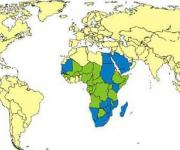The appearance of infectious nodular dermatitis (IND) in the Caucasus and in the Russian Federation increases the possibility of further spread of this disease to other countries of Eastern Europe. Belarus, the Republic of Moldova and Ukraine are high-risk countries, and it is therefore necessary to develop and adopt a regional emergency response and preparedness plan as soon as possible, agronews.ua reports.
The extensive experience of FAO in the control of infectious nodular dermatitis in the Balkans and the Caucasus makes it possible to launch a new regional project to strengthen the preparedness to respond and prevent the spread of CND, which will begin with a technical seminar in Kyiv.
Since IND is a new disease, veterinary services in these countries do not have experience with transboundary diseases. Potential serious problems include economic losses from livestock death, decreased animal productivity, high cost of vaccination programs and management of outbreaks, and, most importantly, trade restrictions. The risk of spreading of the disease to Belarus, the Republic of Moldova and Ukraine is very high, due to the common borders of these countries.
The participants of today's technical seminar are representatives of the state veterinary services, national and international experts of FAO, as well as representatives of other state and international structures.
"It is very important to reduce the risk of outbreaks and the spread of the IND virus, especially in countries that are not yet infected, and therefore are not familiar with it," says Andrii Rozstalnyi, a specialist of the FAO Regional Office for Europe and Central Asia on Livestock and Veterinary . "That's why the new FAO project is launched here. Its main task is to build the capacity of state veterinary services for the early detection of IND and prevent its spread, to strengthen regional cooperation in the field of early warning and response to this transboundary disease, and to raise awareness of field veterinarians, farmers and the scientific community."
FAO's approach to disease control is based on careful monitoring of the situation through continuous risk assessment and harmonization of actions aimed at monitoring and prevention, the introduction of a vaccination program and the creation of regional platforms for the exchange of information, experiences and practical recommendations within the country. This project will bring together leading experts to address the specific problems inherent in each individual country, exploring new approaches for reducing risk and controlling outbreaks if necessary.
FAO has already developed a contingency plan for IND to assist veterinary services in developing appropriate national strategies, taking into account the characteristics of the country. This plan will be the main tool of the project to control and early response to the disease. A practical manual for field veterinarians was also developed in Romanian, Russian and Ukrainian, which will be printed and distributed to field veterinarians in three countries.
The two-day seminar will be continued by a program to train 10 field veterinarians for the specificity of infectious nodular dermatitis, which will then be broadcast in areas of increased risk. In addition, field veterinarians will disseminate the experience gained among local consultants in the three beneficiary countries of the project.














 Лобіювання інтересів тваринників в органах виконавчої влади
Лобіювання інтересів тваринників в органах виконавчої влади Участь в науково-практичних заходах Асоціації із залученням європейських експертів світового рівня
Участь в науково-практичних заходах Асоціації із залученням європейських експертів світового рівня Щотижневий огляд тенденцій та прогнозів розвитку тваринницької галузі
Щотижневий огляд тенденцій та прогнозів розвитку тваринницької галузі